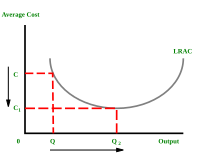
Photo from wikipedia
Spray-compacted hypereutectic Al–Si alloy is one of the most important lightweight materials for casting components in electric vehicles. Size effects in such alloys jointed by continuous drive friction welding have… Click to show full abstract
Spray-compacted hypereutectic Al–Si alloy is one of the most important lightweight materials for casting components in electric vehicles. Size effects in such alloys jointed by continuous drive friction welding have been investigated by connecting the interfacial microstructure with the joint strength. The nature of phases present, the topology, and the dispersion of particles have been examined carefully. The mechanical properties of joints have been characterized by transverse tensile tests, microhardness tests, XRD residual stress measurements, and finite element simulations. Size effects on the strengthening of the joint strength and the fracture of particles have been evaluated qualitatively and quantitatively. It has been confirmed that the micromechanical strengthening, which is related to the average particle size d and proportional to d−0.5, and the residual stress together determine the joint strength. By means of the fracture-mechanical analysis, a lower and an upper limit of the particle size have been defined to assess whether a particle can be refined or not during continuous drive friction welding.
Journal Title: Advanced Engineering Materials
Year Published: 2017
Link to full text (if available)
Share on Social Media: Sign Up to like & get
recommendations!